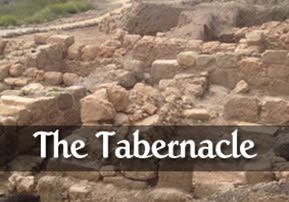
The Tabernacle
Shilo in Samaria is the site of the holy Tabernacle, the Mishkan, which served as the focal point of Judaism and the spiritual capitol of the Jewish People for over 369 years...

I have lived in the Holy Land of Israel, Eretz Yisrael, for more than twenty years, thank G-d, and have yet to see most of the awesome sites Hashem created for us. Last week I took a journey with a group of amazing women and together we experienced what can be described as nothing less than magnificent. We discovered Shiloh which was once the focal point in Judaism, the spiritual capital of its time, where the Holy Mishkan (Tabernacle) stood for 369 years!
“And the whole congregation of the children of Israel assembled themselves together at Shiloh, and set up the tent of meeting there; and the land was subdued before them. And there remained among the children of Israel seven tribes, which had not yet received their inheritance.” (Yehoshua [Joshua] 18:1-2).
An interesting parallel was brought up that just as seven shvatim (tribes) were in Shiloh so many years ago, seven families were the first to settle the modern day town of Shiloh.
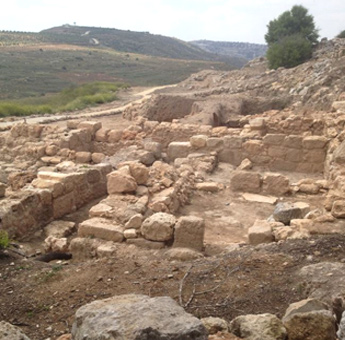
Above image by Jessie Schechter
As we made our way down the rocky path down toward the site where it is believed the ancient and sacred Mishkan stood, we each felt kedusha, holiness, in the air. Our well-versed tour guide pointed out the excavations along the way, proof of the biblical history which preceded us. There were the remains of a Byzantine-era church, and we were told that most probably, the architecture of a shul (synagogue) from the Second Temple Period was buried beneath it. It has yet to be unearthed. An aged stone olive press adorned the landscape, allowing our imaginations to envision the earlier period of our people, living on the Land through the most difficult of circumstances.
The highlight of our visit took place at the same spot where Chana, the wife of Elkana, poured her heart out to Hashem, beseeching him to grant her a child (Samuel 1:10-11). As a result of this heartfelt prayer, she gave birth to Shmuel (Samuel), who would become a Prophet and future leader of the Jewish People. Due to this wondrous precedent, praying at the same location has become recognized as a segula* to have a baby. (*A segula is a tradition rooted in Kabbalah that is known to bring a remedy or protection for one’s misfortunes).
So there we stood, more than a dozen ‘Chanas’ from all parts of Israel, praying from our hearts on some of the holiest ground on earth. Each of us read our lists of names of people needing personal salvations. It seems there is no end to those in desperate situations, whether it is illness, G-d forbid, finding a soul mate, conceiving babies or attaining the funds necessary to make ends meet and more. So we turned toward Yerushalayim (Jerusalem) and asked HaKadosh Baruch Hu (The Holy One, Blessed is He) for help, pleading for miracles as He granted our righteous grandmother, Chana.
From there we proceeded up the hill to the present-day Shiloh and shared a bite to eat at the local pizzeria. One learned lady in our group named Bracha gave a short Devar Torah. She repeated what her Rabbis, most notably Rav Yair Hiller of Netzarim/Ariel, taught that whenever you see a new yishuv (settlement) in Eretz Yisrael, you make a bracha (blessing). Rav Hiller quoted a letter of Rav Kook, in Igrot Ra’a’va, wherein he talked about revisiting the moshava (today’s city) of Rechovot. This bracha is found in the Artscroll Siddur under the blessing we say when one sees a destroyed synagogue that has been restored to its previous grandeur. It is based on the Gemara Brachot 58:2, which uses as its source a verse in Mishlei 15:25. The blessing is “Baruch Ata Hashem Elokeinu Melech Ha’Olam meitziv g’vul almana”. While it literally means “Blessed are You, Hashem, our G-d, King of the Universe, who sets a limit for a widow”, the deeper meaning is that Hashem has restored the glory of a community in Eretz Yisrael, depicted as the almanah, widow. She concluded her lesson by reciting the bracha with all of us in mind, to which we responded ‘Amen’.
Our trip to Shiloh was a very humbling outing. We learned of the sacrifices our ancestors incurred just to have the privilege to live in the Holy Land. One realization evolving from this event was how blessed each of us were to merit making our homes in the Land Hashem gave to our People and prayed for the rest of our family and friends to join us here one day soon. As was heard from Rabbi Lazer Brody and as it states in Talmud, Ketubot 110b: One should live in Eretz Yisrael, even in a city that is mostly Nochrim (non-Jews), but not in Chutz L’Aretz (outside Israel), even in a city which is mostly Jews. And in Ketubot 111a, we learn that whoever walks four amot in Eretz Yisrael is guaranteed entrance to the World to Come. The Rambam takes it one step further by teaching in Hilchot Melachim 5:11 that ‘the sins of those who live in Eretz Yisrael are forgiven’. This is not something any individual should willingly pass up regardless of the hardships he may endure in moving here. As the Peleh Yoetz writes: “He who lives in Eretz Yisrael should be perpetually happy with his mitzvah and all the suffering he experiences should be insignificant to him in light of his love for this mitzvah!” (Peleh Yoetz Eretz).
Regardless of whether or not it is possible to make Israel one’s home at this present time, we must each build our own personal Mishkan, a “bayit ne’eman b’Yisrael,” a home faithful to the traditions of Israel, thereby allowing Hashem’s Light to flow within. Through this, we will aspire to be a Light Unto the Nations.
I also feel compelled to share the collective outlook of these wonderful and virtuous ladies – the need for unity amongst our brothers and sisters. We are all one. We have one Father and we are obligated to care for each and every Jew as we care about ourselves. “Love Your Fellow as Yourself” (Leviticus 19:18). All the infighting must stop. It is our responsibility to love each other regardless of our station in life, undertaking that duty with diligence and sincerity. Only then, will G-d finally find us worthy to welcome Mashiach and redeemed us from our enemies as in days of old.
“And they said to Joshua, ‘For the Lord has delivered into our hands all the land; and also the inhabitants of the country have melted away because of us’.” (Joshua 2:24)
May it be His Will, speedily in the coming days, Amen!
***
For information about Shiloh HaKeduma, Tel Shiloh, contact visit@telshilo.org.il or call 02-994-4019. They cater to both groups and individual visitors besides running large public events during Jewish Holidays.


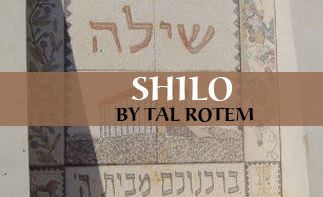

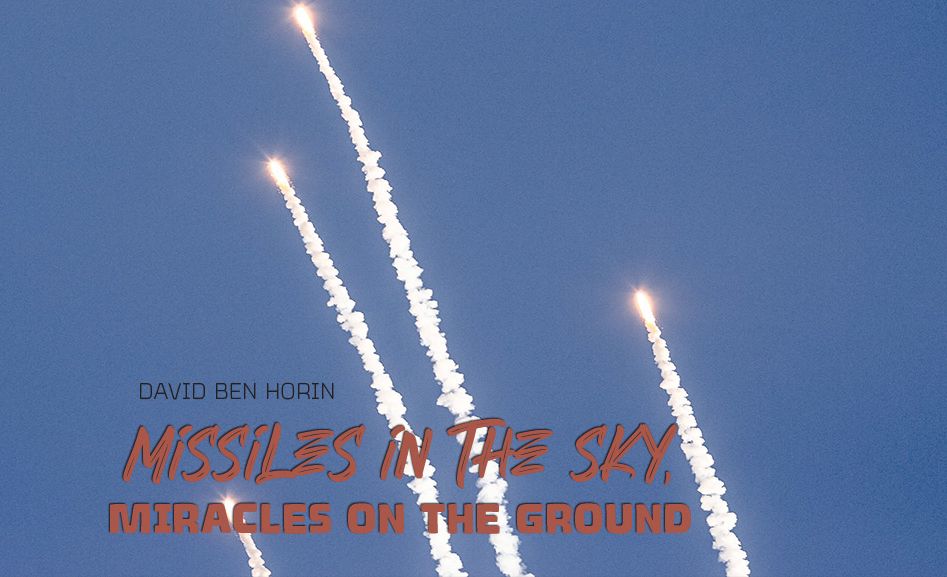
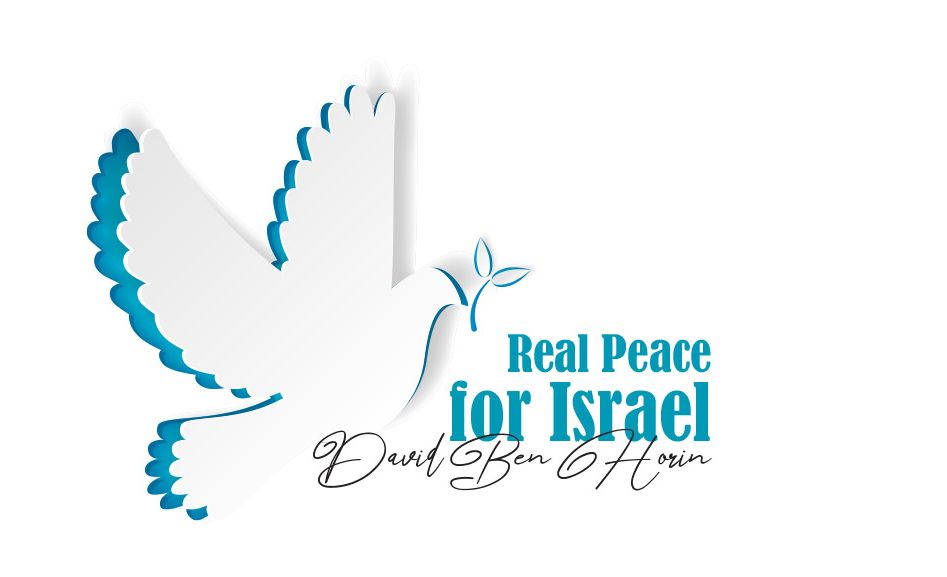
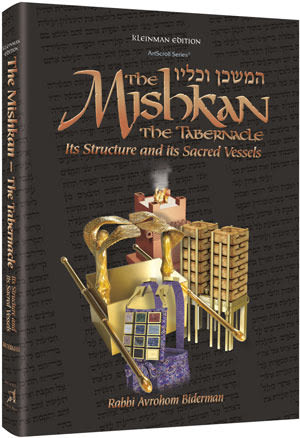
5/27/2013
Wonderful article! Chaya Golda, you've done it again. Each of your essays is wonderful and this is no exception! I am so sorry I was unable to share in the Shiloh experience with the CT ladies. Be"H another time. Kol hakavod to you on writing an essay that made me feel like I could have been there!
5/27/2013
Chaya Golda, you've done it again. Each of your essays is wonderful and this is no exception! I am so sorry I was unable to share in the Shiloh experience with the CT ladies. Be"H another time. Kol hakavod to you on writing an essay that made me feel like I could have been there!
5/27/2013
A day I won’t forget.. Chaya, your words beautifully describes our meaningful and magnificent day we had in Shilo. Never in my life did my davening have so much meaning..I was on such a high! Miriam